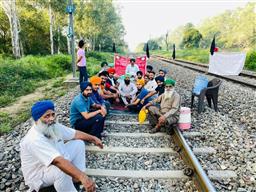
Annalena Baerbock of the Greens waits to cast her vote in Potsdam, Germany. Reuters
AACHEN/POTSDAM, September 26
Germany's centre-left Social Democrats were locked in a very close race on Sunday with outgoing German Chancellor Angela Merkel’s centre-right bloc, which is heading toward its worst result since 1949 in the country's parliamentary election, exit polls showed.
One voter, two votes
- To win representation in Parliament as a group, a party needs to pass the 5% threshold or have three directly elected candidates
- Germany has a proportional representation election system, where each voter has two votes. The first one is for a candidate, the other for a party
How is chancellor elected
- The new government is formed when the Bundestag elects a Chancellor with an absolute majority of over 50 per cent
- Cabinet ministers are then named. When all of them have officially been appointed by the President and sworn in Parliament, the new government takes office
- Till then, Chancellor Angela Merkel will remain in office in a caretaker role
Who’s who
- Armin Laschet, conservative politician who has led the North Rhine-Westphalia region since 2017 and became the head of the centre-right CDU party in January, was being viewed as the most likely successor to Merkel at the start of the campaign, but his popularity has dropped recently
- Olaf Scholz, socialist candidate and Germany’s finance minister, has perhaps been the biggest surprise in the campaign
- Annalena Baerbock, the Green party representative, is likely to have a key role in coalition talks
Voting gaffe by candidate
Conservative chancellor candidate Armin Laschet was ridiculed on social media for a misstep on the election day. He folded his ballot the wrong way, revealing which party he had voted for before dropping it in the box.
Officials from both parties said they hoped to lead Germany's next government and have their candidates succeed Merkel, who has been in power since 2005. An exit poll for ARD public television put voters' support at 25 per cent each for the Social Democrats — which is putting forth outgoing Vice Chancellor Olaf Scholz for Chancellor — and Merkel's Union bloc under would-be successor state governor Armin Laschet.
Another exit poll for ZDF public television put the Social Democrats ahead by 26 per cent to 24 per cent. Both put the environmentalist Greens in third place with about 15 per cent support. Those results would be the worst for the Union bloc in post-World War II Germany.
The electoral system typically produces coalition governments but post-war Germany has never previously seen a winning party take less than the 31 per cent of the vote that the Union won in 1949. That was also the centre-right bloc's worst result until now.
Given the exit poll predictions, putting together the next coalition government for Europe's biggest economy could be a lengthy and complicated process. Merkel will remain a caretaker leader until a new government is in place.
The exit polls also put support for the business-friendly Free Democrats at 11-12per cent and the Left Party at 5 per cent. The far-right Alternative for Germany party — which no other party wants to work with — was seen winning up to 11 per cent of the vote. The general secretary of Laschet's Christian Democratic Union, Paul Ziemiak, acknowledged that his bloc had suffered “bitter losses” compared with the last election four years ago, in which it scored 32.9 per cent of the vote. But he said it would be a “long election evening” and pointed to the possibility of a coalition with the Greens and the business-friendly Free Democrats.
His Social Democrat counterpart, Lars Klingbeil, declared that his party “is back” after languishing for years in the polls and scoring only 20.5per cent of the vote in 2017. — AP
Tribune Shorts
Most Read




















